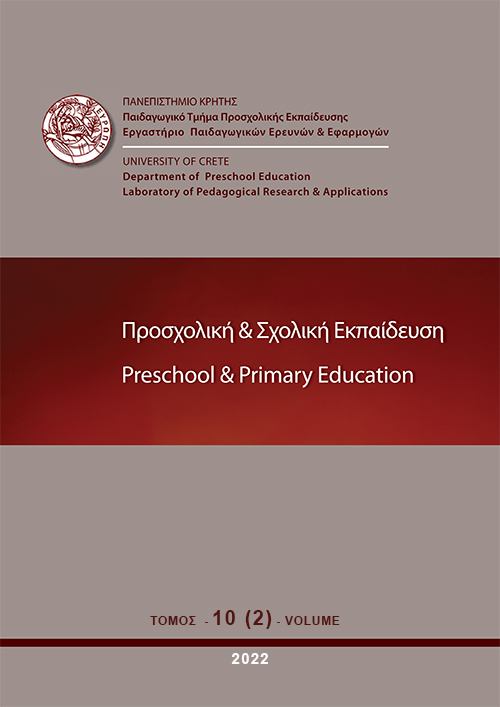Κατασκευάζοντας μια νέα παιδαγωγική ατζέντα λήψης αποφάσεων: ο ρόλος της μαθητικής ηγεσίας σε συνθήκες πολιτισμικού πλουραλισμού

Περίληψη
Η σύγχρονη βιβλιογραφία έχει επανειλημμένα εστιάσει στον ποικίλο ρόλο των μαθητικών φωνών και στον τρόπο επίδρασής τους στις διαδικασίες της αλλαγής και της σχολικής βελτίωσης. Ωστόσο, δεν έχουν διερευνηθεί οι τρόποι με τους οποίους τα ίδια τα παιδιά ερμηνεύουν τους ρόλους τους ως ηγέτες, ιδιαίτερα σε περιβάλλοντα που χαρακτηρίζονται από πολιτισμικό πλουραλισμό. Η έρευνα που παρουσιάζουμε επικεντρώνεται στον αυτόβουλο χαρακτήρα της ανάληψης ηγεσίας εκ μέρους των μαθητών και μαθητριών, ώστε να μετεξελιχθούν σε ισότιμους συμπαραγωγούς μιας νέας παιδαγωγικής ατζέντας λήψης αποφάσεων. Το δείγμα μας αποτελούνταν από 36 μαθητές και μαθήτριες που φοιτούσαν σε τέσσερα επαρχιακά σχολεία δευτεροβάθμιας εκπαίδευσης του Νομού Φθιώτιδας. Για τη συλλογή των ερευνητικών δεδομένων αξιοποιήθηκε η ποιοτική μέθοδος με τη χρήση ημιδομημένων συνεντεύξεων. Από την επεξεργασία του ερευνητικού υλικού αναδύονται οι αυτόβουλες κοινωνικο-ακτιβιστικές πρωτοβουλίες και δράσεις που αναλαμβάνουν οι μαθητές και οι μαθήτριες, που προοιωνίζουν αφενός την επίτευξη ενός κοινωνικού και εκπαιδευτικού μετασχηματισμού και αφετέρου τη μετατροπή τους από «πολίτες σε αναμονή» σε αυθεντικούς συνδιαμορφωτές των σχολικών πολιτικών. Τα αποτελέσματα που καταγράφει η παρούσα έρευνα δύνανται να έχουν πολλαπλές επιπτώσεις τόσο στο πεδίο της εκπαιδευτικής πολιτικής όσο και σε αυτό των σχολικών πρακτικών.
Λεπτομέρειες άρθρου
- Πώς να δημιουργήσετε Αναφορές
-
Σόρκος Γ., & Χατζησωτηρίου Χ. (2022). Κατασκευάζοντας μια νέα παιδαγωγική ατζέντα λήψης αποφάσεων: ο ρόλος της μαθητικής ηγεσίας σε συνθήκες πολιτισμικού πλουραλισμού. Preschool and Primary Education, 10(2), 221–238. https://doi.org/10.12681/ppej.28032
- Ενότητα
- Άρθρα

Αυτή η εργασία είναι αδειοδοτημένη υπό το CC Αναφορά Δημιουργού – Μη Εμπορική Χρήση – Παρόμοια Διανομή 4.0.
Οι συγγραφείς των άρθρων που δημοσιεύονται στο ΠΡΟΣΧΟΛΙΚΗ & ΣΧΟΛΙΚΗ ΕΚΠΑΙΔΕΥΣΗ διατηρούν τα δικαιώματα πνευματικής ιδιοκτησίας επί των άρθρων τους, δίνοντας στο περιοδικό το δικαίωμα της πρώτης δημοσίευσης. Άρθρα που δημοσιεύονται στο ΠΡΟΣΧΟΛΙΚΗ & ΣΧΟΛΙΚΗ ΕΚΠΑΙΔΕΥΣΗ διατίθενται με άδεια Creative Commons 3.0 και σύμφωνα με την άδεια μπορούν να χρησιμοποιούνται ελεύθερα, με αναφορά στο/στη συγγραφέα και στην πρώτη δημοσίευση για μη κερδοσκοπικούς σκοπούς και με δικαίωμα τροποποίησης μόνον με παρόμοια διανομή (αν αναμείξετε, τροποποιήσετε, ή δημιουργήσετε πάνω στο υλικό, πρέπει να διανείμετε τις δικές σας συνεισφορές υπό την ίδια άδεια όπως και το πρωτότυπο). To Εργαστήριο Παιδαγωγικών Ερευνών και Εφαρμογών του Παιδαγωγικού Τμήματος Προσχολικής Εκπαίδευσης του Πανεπιστημίου Κρήτης και το Εθνικό Κέντρο Τεκμηρίωσης διατηρούν το δικαίωμα να δημοσιεύουν, να αναπαραγάγουν, να παρουσιάζουν στο κοινό, να διανέμουν και χρησιμοποιούν άρθρα που δημοσιεύονται στο ΠΡΟΣΧΟΛΙΚΗ & ΣΧΟΛΙΚΗ ΕΚΠΑΙΔΕΥΣΗ σε οποιοδήποτε μέσο και μορφή είτε μεμονωμένα είτε ως μέρη συλλογικών έργων, για όλο το χρόνο διάρκειας προστασίας της πνευματικής ιδιοκτησίας και για όλες τις χώρες του κόσμου. Αυτό περιλαμβάνει ενδεικτικά και όχι αποκλειστικά, το δικαίωμα δημοσίευσης των άρθρων σε τεύχη του περιοδικού ΠΡΟΣΧΟΛΙΚΗ & ΣΧΟΛΙΚΗ ΕΚΠΑΙΔΕΥΣΗ, αναπαραγωγής και διανομής μεμονωμένων αντιγράφων των άρθρων, αναπαραγωγής ολόκληρων των άρθρων σε άλλη έκδοση του Εργαστηρίου Παιδαγωγικών Ερευνών και Εφαρμογών του Παιδαγωγικού Τμήματος Προσχολικής Εκπαίδευσης του Πανεπιστημίου Κρήτης και του Εθνικού Κέντρου Τεκμηρίωσης και αναπαραγωγής και διανομής των άρθρων ή περίληψης αυτών με χρήση πληροφορικού συστήματος αποθετηρίου.


